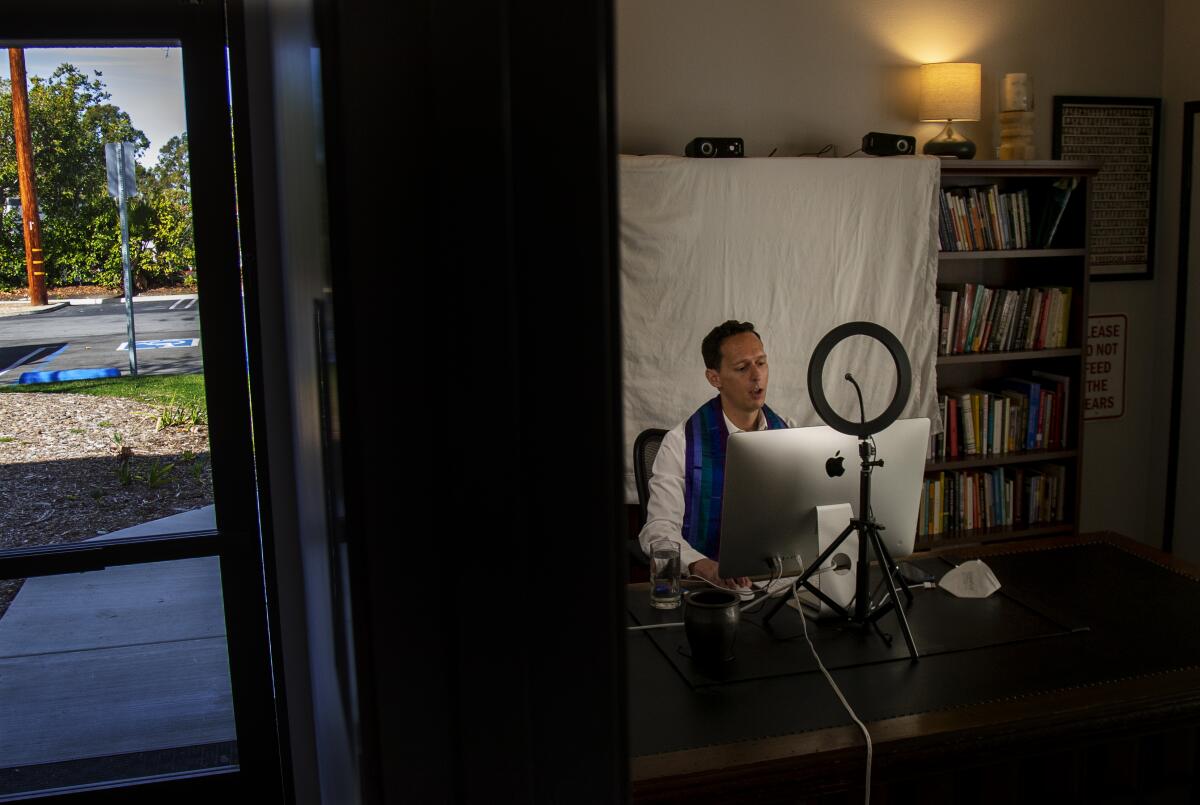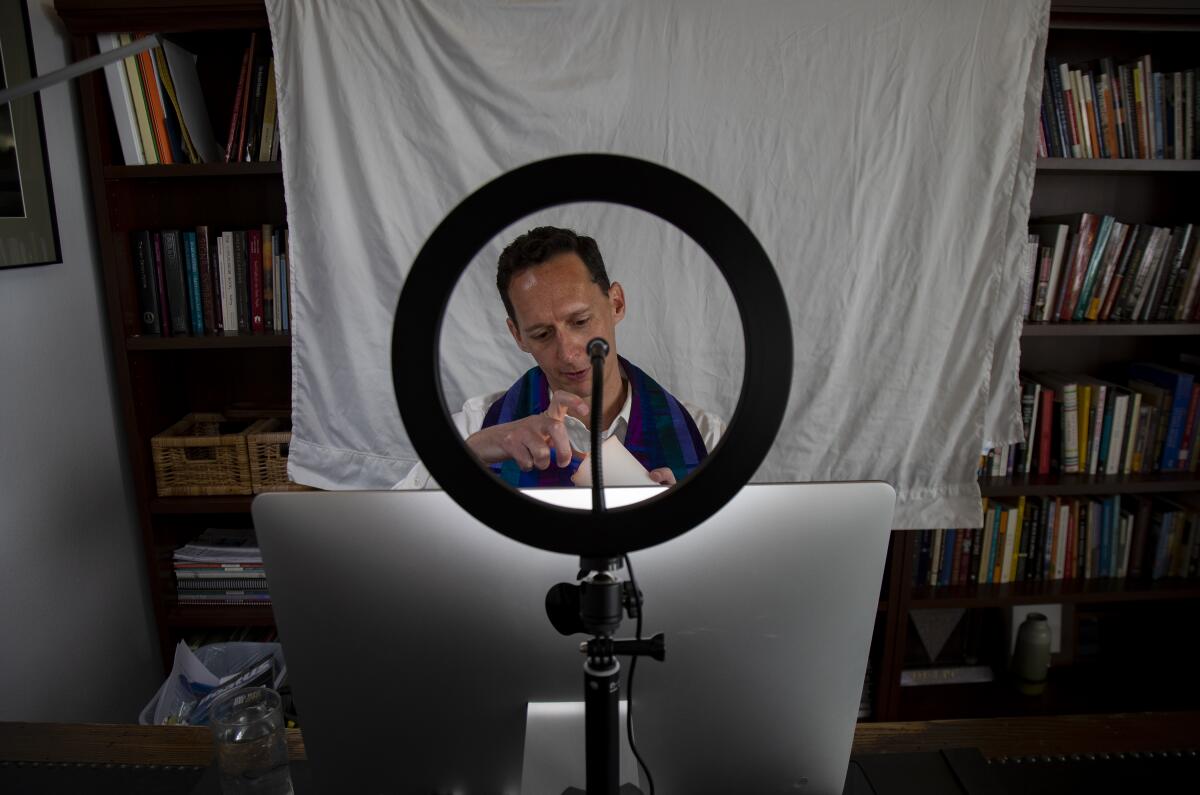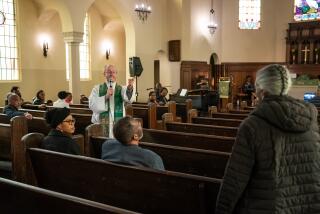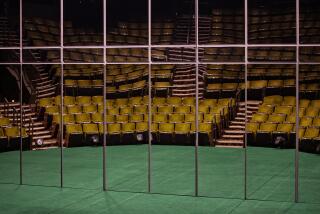‘Distanced in body but close in spirit’: this California church embraced remote worship

- Share via
The main hall at Tapestry, a Unitarian Universalist congregation in Lake Forest, stood empty on Valentine’s Day. A padded blanket covered the piano from where music director Melissa Sky-Eagle typically leads everyone in song. Nametags that members wear whenever they gather — customary for the religion as a way to welcome visitors — hung unused near the entrance.
The sounds of a one-man Christian rock band from a church in the same business park echoed outside. But Tapestry hasn’t worshipped in person since March, since the beginning of the COVID-19 pandemic.
“We bought this building over two years ago, yet have used it for about half that time,” the Rev. Kent Doss told me as he sat in his office in front of an iMac. He said it in a matter-of-fact tone — not out of rudeness or bitterness, but because he had a job to do.
It was almost time for service.
The 42-year-old minister hung a multi-hued stole around his neck, and a white sheet over his bookcase. He removed his mask, then turned on two spotlights. With a click of a Zoom link, Doss began to chatter with his faraway flock as if all was well with the world.
And for the next hour or so, it was.
Instead of just one person lighting a chalice, as all Unitarian Universalists services start, most of the 86 attendees sparked up candles at their homes. Sky-Eagle and other musicians and singers dazzled with their prerecorded, synced-up hymns and secular classics, like a bilingual version of “This Little Light of Mine.” Doss offered a sermon on the manifestations of love that quoted everyone from St. John of the Cross to the Hindu mystic poet Mirabai.

“Every Sunday I’m blown away at what you put together,” Doss told the Tapestry faithful at one point as he led them in a moment of silence. “Feel this community distanced in body but close in spirit. Share your compassion with our world that’s quite frightened these days.”
Most of those who logged in stuck around to catch up with one another in randomly assigned Zoom breakout rooms. I saw all of this on my laptop, from Tapestry’s empty coffee room. But the web service was no less sacred and moving than it would’ve been in the flesh.
And until all adults are eligible to be vaccinated, it’s going to stay that way.
“If some aren’t healthy to be here, we won’t” gather en masse, said Doss. “We’ve been very committed to be inclusive.”
It’s the opposite opinion of nearly every other house of worship in California, especially after the Supreme Court ruled earlier this month that Gov. Gavin Newsom’s mandate banning indoor services was unconstitutional.
Religious leaders and lay people alike have argued for months that stopping them from praying alongside one another does irreparable mental and spiritual harm. But as a believer, I don’t buy the argument. And, yes, I have Scripture to back me up: Matthew 18:20, where Jesus says, “Where two or three gather in my name, there am I with them.”
More importantly, I have Tapestry. If they can channel the Divine digitally, anyone can.
Long a force in south Orange County progressive politics, its members have sought to find blessings in this pandemic where others only look for the chaff.
“I don’t feel like I’m missing anything,” says Laguna Niguel resident Debbie Salahi, 64, who has belonged to Tapestry along with her husband Dave for 20 years.
“I can’t wait until we’re together again,” said Dave Weber of Aliso Viejo. “But if you have common values, you can survive.”
“I think we’ve actually become more involved and responsive,” said 78-year-old Susan Jagielko. “It’s like, ‘Gee we need to dig a little deeper and reach out to those who need help.’”
She compared the current state of Tapestry to how the Athenian general Themistocles once described the namesake fabric: “When you unfold it, it reveals all these woven threads, and it becomes beautiful.”
Doss “immediately” recognized Tapestry had to deal with the coronavirus. His congregation is multigenerational — mostly boomers and Gen Xers, but with a healthy contingent of families, millennials, and even small children.
By January, he was asking congregants not to hold or shake hands. In early March, he quickly canceled in-person service. After that, Doss stumbled around for an alternative.
His first attempt at an online sermon, via Facebook Live, was buggy. He realized Tapestry had to buy a professional Zoom account instead of using a free option in order to accommodate their 150-plus membership. Someone hacked into a session and shocked viewers. Doss had to buy a fiber-optic cable to plug directly into Tapestry’s modem after discovering his Wi-Fi connection was too weak for Zoom’s ravenous bandwidth.
“It took months for me to feel like we were providing something meaningful and helpful to people,” said Doss, who has led Tapestry for nearly eight years. “It’s still strange to preach to a computer screen on my desk. In person, I can look across the room and think, ‘Richard sits over there, and Linda there,’ and ground myself in the moment.”
But Doss learned quickly. “The larger the room is, the larger you have to play,” he said. “You have to be more emphatic. Online, sitting at my desk, preaching becomes very intimate.”
His calm, resonant voice and words of hope have kept Tapestry strong. Membership remains steady — some left, while others who had moved away now log in regularly. Doss keeps office hours on Tuesday and Thursday so people can drop off bags of groceries for food banks.
Newcomers also invigorated Tapestry with the enthusiasm of acolytes. That “has encouraged and pushed new leadership to step up,” Jagielko said. “They’re picking up the gauntlet.”
They worked on Tapestry’s myriad social justice causes — affordable housing, immigrant rights, homelessness — from home or on the streets. Suzy Staulz, a retired nurse who lives in Laguna Woods, joined Tapestry’s long-standing inmate correspondence program.
“It’s been a saving grace for me to be involved,” she said. “Here, it’s not about doing whatever you want all week, then show up to church on Sunday. The coronavirus gets you to think about purpose.”
Director of religious education Rob Nicholas, 35, started his job just a year ago. He leads monthly socially distanced hikes and began a much praised pen-pal program between the youngest and oldest Tapestry members.
“I had no virtual curriculum on me when I started,” Nicholas said. “So it was this slow mindset shift for me about making what we’re dealing with now less about lessons from a book and more about community.”
Doss doesn’t see why other churches can’t replicate Tapestry’s model while COVID-19 continues to menace the world, and finds the politicization of the issue by more conservative pastors “frustrating.” But he also acknowledged Tapestry’s privilege.
“Part of me is torn because we are a predominantly white, professional community that’s comfortable online,” he said. “Some congregations are not in that demographic area. Meeting in person for them may be the only way to see each other, so I don’t want to be too harsh.
“But if that’s the issue,” he continued, “that’s very different from saying COVID is a liberal hoax and God will protect us.”
Jagielko said in-person service isn’t even the purpose of Tapestry, ultimately. “Our covenant is not to meet, although we’d obviously like to,” she said. “It’s to help one another and others. That’s continuing, because that will never stop.”
More to Read
Sign up for Essential California
The most important California stories and recommendations in your inbox every morning.
You may occasionally receive promotional content from the Los Angeles Times.











